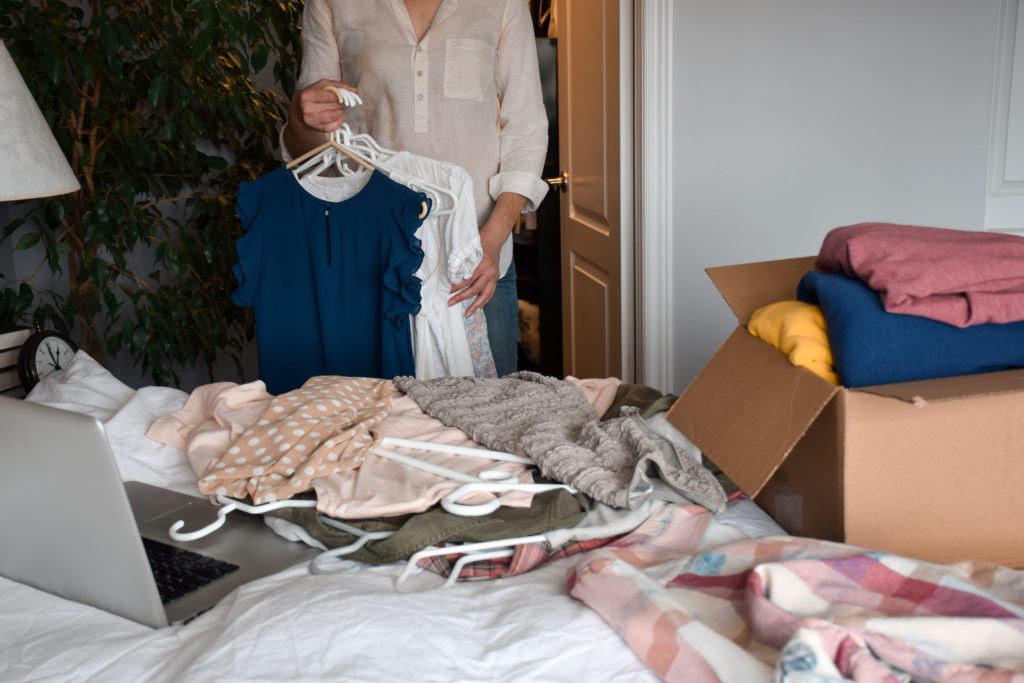Is your closet or dresser packed with clothes you no longer wear? It might be time for a closet cleanout. Cleaning out your closet is as much about decluttering as it is about rediscovering and refining your style. Not only can you free up valuable space by getting rid of items you don’t want, but you can also give your unwanted items a new life. Here’s a step-by-step guide to refreshing your wardrobe and responsibly getting rid of the pieces you no longer need.
Step 1: Prepare and Set Goals
Before diving in, set goals for your closet cleanout. Do you just want to get rid of items that no longer fit or that you no longer like? Do you want to reduce your wardrobe size or make room to update your style? Maybe you want to be able to organize your space more effectively. After you figure out your end goal, you’ll also want to gather necessary supplies like boxes or bags for sorting and sticky notes for labeling.

Step 2: Plan Your Cleanout Method
It’s important to find a closet cleanout method that works for you—or else you may not feel motivated to finish the project. For some, taking everything out of the closet in the beginning and only putting back the items you’re going to keep might be an effective method. For others, that can feel like more clutter accumulation (for example, piles of clothes on the bed), and instead choose to go through items one by one and put unwanted items directly in bags or boxes. Others still might benefit by working in sections, like only emptying one drawer at a time.
If you do choose to remove everything from your dresser or closet, take the opportunity to clean it thoroughly—wipe down any shelves, sweep the floor, and consider adding fresh liners or organizing tools.
Step 3: Sort Your Clothing
When sorting your clothing, use designated areas or boxes for different categories, such as keep, donate, repair, and recycle. As you look at each item, ask yourself questions like:
- Have I worn this in the last year?
- Does it fit my current style and lifestyle?
- Does it fit me the way I want it to?
- Is it in good condition?
Step 4: Try Things On
For items you’re unsure about, try them on and see how you feel. Check the fit, comfort, and how well they pair with other items in your wardrobe. This can be a time-consuming step, but it’s important during the decision-making process. It may be the deciding factor!
Step 5: Organize Your Keepers
Once you’ve decided what stays, reorganize these items back into your closet or dresser. Group clothing by category (pants, shirts, dresses, etc.) and by color or season, depending on what makes sense for you and your lifestyle. Invest in good hangers and storage solutions, like bins or drawer organizers, to maintain an organized space.
Step 6: Get Rid of Your Items Responsibly
For the clothing items you’ve chosen to bless and release, you have a few options. Do some research to find local charities that accept clean, gently-used clothing donations. Consider organizations that directly benefit those in need, such as shelters, job training programs, or refugee resettlement programs.
You might also consider donating your items to a local thrift store or participating in a local clothing swap. If some items are too worn for donation, look into textile recycling programs or upcycle them yourself.
If you’d like to try to make a little bit of money off of your items, you could sell your clothing at a consignment store or hold a yard sale. Online marketplaces such as Poshmark or Mercari are also popular ways to sell clothes secondhand.
Step 7: Maintain an Organized Wardrobe
Keep your closet in check by regularly revisiting its contents. A good rule of thumb is to review your wardrobe each season. If you struggle with accumulating clothes you rarely wear, consider implementing a one-in, one-out policy—where you get rid of one item for every new piece you add.
A thoughtful closet cleanout can refresh your style, declutter your home, and make your daily routine smoother. Moreover, by donating, upcycling, or selling your unwanted items instead of throwing them out, you also contribute to sustainability practices and even support someone in need. Remember these tips next time you go through your clothes!

